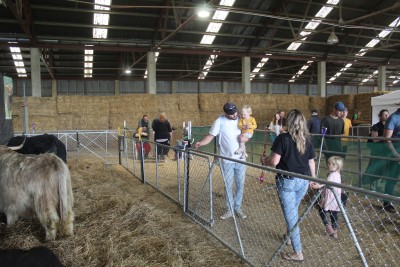 NAIT and biosecurity procedures trialled at Wairarapa A&P show
NAIT and biosecurity procedures trialled at Wairarapa A&P show
At the recent A&P show in Carterton, lifestyler champion Lisa Berthold added a traceability and biosecurity element to the event, to ensure that the beef and dairy cattle were tracked, traced and scrubbed down and separated in stalls ready for show and tell.
Lisa said she had been working on the plan for several months leading up to the show and had received the endorsement of OSPRI from a NAIT and TBfree perspective.
“With the cancellation of A&P shows for the last couple of years due to COVID, the uptake to take part in the A&P show has been quite slow, and M. bovis has also stopped cattle from being shown,” said Lisa.
“A way of encouraging people to return is to put precautionary procedures in place that ensure the animals are not in any danger of spreading disease. This is particularly relevant at the moment given the new strain of M. bovis identified in the Canterbury region and the threat of foot-and-mouth disease entering the country.”
 A reminder to event organisers and attendees
A reminder to event organisers and attendees
As field days and A&P shows take place in the coming months, it's more important than ever to ensure animal traceability is maintained. For event organisers, make sure to register your event NAIT number prior to the event taking place, and ensure that attendees bringing animals are aware of that number.
You can register an event NAIT number by contacting our Support Centre on 0800 482 463. For regular or annual events, you can use the same event number, as long as the event is in the same location - Our Support Centre can update the dates for you.
For attendees, creating a movement to the event is the same process as creating a movement to another farm, except that you record movements to and from the event against the organiser's event NAIT number. You don't need to complete an Animal Status Declaration (ASD) form.
 OSPRI advising hunters not to release pigs into new areas
OSPRI advising hunters not to release pigs into new areas
Over the years, OSPRI has worked hard to eradicate TB in possums from large areas of New Zealand. OSPRI’s North Island regional partner Phil Dawson says this work can all be undone by the reintroduction of TB infected pigs with the potential of spill back of infection into the possum population. "Essentially moving and releasing pigs from one area to another area can also introduce TB into an area. Possums can scavenge a hunted pig carcass or offal and get infected with TB."
Steve McFall from the Te Kuiti Pig Hunting Club explains that anyone who is releasing pigs from an area that is TB country is putting pig hunting at risk and could severely restrict hunting in that region.
"The ramifications for livestock are huge, and it also negatively impacts the pig hunter because if TB is found in wildlife in the region any control measures taken can interrupt hunting in that area."
 Foot-and-mouth disease - Play your part, update NAIT
Foot-and-mouth disease - Play your part, update NAIT
In the unlikely event foot-and-mouth disease was to enter New Zealand, it would be devastating to the primary sector and our rural communities.
OSPRI is working closely with MPI and the primary sector to ensure we are optimally utilising the tools and data we have available to support a response team in the event of an outbreak.
Farmers can contribute to the accuracy of the data the biosecurity response team will need in the event of an outbreak by doing the following:
• ensure your contact details in NAIT are correct
• tag and register all of your NAIT animals
• record all movements within 48 hours
• sign up to MyOSPRI.

